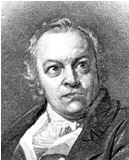Songs of Innocence and Experience by William Blake
Page 13 of 18 - 1 2 3 4 5 6 7 8 9 10 11 12 13 14 15 16 17 18 Purchase full notes for £5.95 (aprox $9.28)
The portion of the Holy Word to which the Bard alludes is not one of kindness and forgiveness, but of condemnation and judgement: Adam and Eve have disobeyed God and are about to be thrust out of paradise. They are now set below ‘God,’ who has the mastery over them, and whom they must now plead with for salvation. God’s power is emphasized in stanza two; humanity is forced to look up at a ‘God’ who ‘might control/The starry pole.’ Finally, what does this ‘God’ offer mankind? The answer is, ‘The starry floor/ The watry shore,’ neither of which sound much like the paradise from which humanity was expelled. This is a ‘God’ (and his prophet) who appears divine, but, in fact, is severely limited by Old Testament notions of justice and necessity. He is a ‘God’ believed in by many – the ‘God,’ in fact, of the experienced world, which approaches theology through reason – but he is fundamentally a false god, or, more precisely, a false image of God, as is confirmed by the next poem in the sequence.
EARTH’S Answer
The illustration for humanity’s reply to the Bard is not without its desolate quality. The ground beneath the text is still swathed in darkness. There is, however, some hope represented by the echoes of innocence vegetation, some of which bears fruit.
Earth’s condition, though, does not inspire much confidence: ‘in the darkness dread & drear’ with ‘her locks cover’d with grey despair.’ From Blake’s perspective, this is not surprising. If all deities ‘reside within the human breast,’ then to hearken to a judgmental and controlling ‘God’ who is actually a projection of our own fears and guilts becomes analogous to a form of schizophrenia. God and Man for Blake are almost synonymous terms: to set one against the other is a key example of the kind of psychological severance that becomes a major theme of his later works.
Earth sees the ‘watry shore’ promised by the Bard as a prison, and the prisoner is not God, but ‘Starry Jealousy.’ This implies further that the stars do have a negative symbolism in Blake (in fact, this is a frequent feature of his later work). The God of the Old Testament also refers to himself as a ‘jealous God’ and Blake is echoing this well-known phrase. What justification does he have, though, for the further depiction of ‘God’ as possessed of ‘Cruel jealous selfish fear’? To understand this, it is necessary to follow Blake’s reasoning to its logical conclusions. If ‘God’ desires man to be at a disadvantage to him – for man to think himself a sinner who must beg for mercy – he obviously desires power over another being .
EARTH’S Answer
The illustration for humanity’s reply to the Bard is not without its desolate quality. The ground beneath the text is still swathed in darkness. There is, however, some hope represented by the echoes of innocence vegetation, some of which bears fruit.
Earth’s condition, though, does not inspire much confidence: ‘in the darkness dread & drear’ with ‘her locks cover’d with grey despair.’ From Blake’s perspective, this is not surprising. If all deities ‘reside within the human breast,’ then to hearken to a judgmental and controlling ‘God’ who is actually a projection of our own fears and guilts becomes analogous to a form of schizophrenia. God and Man for Blake are almost synonymous terms: to set one against the other is a key example of the kind of psychological severance that becomes a major theme of his later works.
Earth sees the ‘watry shore’ promised by the Bard as a prison, and the prisoner is not God, but ‘Starry Jealousy.’ This implies further that the stars do have a negative symbolism in Blake (in fact, this is a frequent feature of his later work). The God of the Old Testament also refers to himself as a ‘jealous God’ and Blake is echoing this well-known phrase. What justification does he have, though, for the further depiction of ‘God’ as possessed of ‘Cruel jealous selfish fear’? To understand this, it is necessary to follow Blake’s reasoning to its logical conclusions. If ‘God’ desires man to be at a disadvantage to him – for man to think himself a sinner who must beg for mercy – he obviously desires power over another being .

